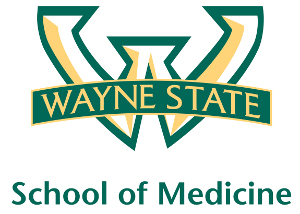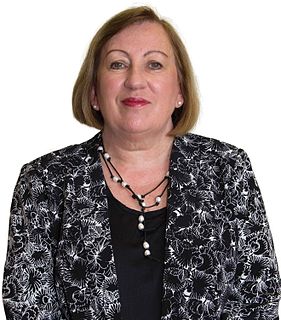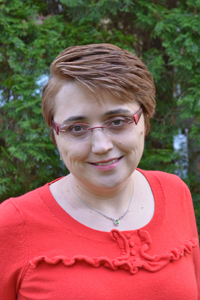Related Research Articles

The Wayne State University School of Medicine (WSUSOM) currently hosts an enrollment of more than 1,500 medical students in undergraduate medical education, master's degree, Ph.D., and M.D.-Ph.D. programs and courses encompass 14 areas of basic science. WSUSOM traces its roots through four predecessor institutions since its founding in 1868. According to U.S. News ranking, the school ranks 70th nationally in its research activities.

The Kolling Institute is located on the grounds of the Royal North Shore Hospital in St Leonards, Sydney Australia. The institute, founded in 1920, is the oldest medical research institute in New South Wales.
Marilyn Gist Farquhar was a pathologist and cellular biologist, Professor of Cellular and Molecular Medicine and Pathology, as well as the chair of the Department of Cellular and Molecular Medicine at the University of California, San Diego School of Medicine, who previously worked at Yale University from 1973 to 1990. She has won the E. B. Wilson Medal and the FASEB Excellence in Science Award. She was married to Nobel Laureate George Emil Palade from 1970 to his death in 2008. Her research focuses on control of intracellular membrane traffic and the molecular pathogenesis of auto immune kidney diseases. She has yielded a number of discoveries in basic biomedical research including: mechanisms of kidney disease, organization of functions that attach cells to one another, and mechanisms of secretions.
Translational research is research aimed at translating (converting) results in basic research into results that directly benefit humans. The term is used in science and technology, especially in biology and medical science. As such, translational research forms a subset of applied research.
Harvey Franklin Lodish is a molecular and cell biologist, professor at the Massachusetts Institute of Technology (MIT), Founding Member of the Whitehead Institute for Biomedical Research, and lead author of the textbook Molecular Cell Biology. Lodish's research focuses on cell surface proteins and other important areas at the interface between molecular cell biology and medicine.

Josephine Forbes is an Australian scientist specialising in the study of glycation and diabetes. She has been studying diabetes since 1999 and has worked at Royal Children's Hospital, University of Melbourne and Baker Heart and Diabetes Institute in Melbourne Australia. Since 2012 she has led the Glycation and Diabetes team at Mater Research which is a world-class medical research institute based at South Brisbane, and part of the Mater Group. Josephine is program leader for Mater's Chronic Disease Biology and Care theme, building greater understanding of the biological basis of a broad range of chronic diseases, and developing preventative strategies and innovative treatments to improve patient outcomes. Josephine and her team focus on how advanced glycation contributes to the pathogenesis of diabetes and its complications such as kidney disease.

Jennifer Lea Stow is deputy director (research), NHMRC Principal Research Fellow and head of the Protein Trafficking and Inflammation laboratory at the Institute for Molecular Bioscience (IMB), The University of Queensland, Australia. She was awarded her PhD from Monash University in Melbourne in 1982. As a Fogarty International Fellow, she completed postdoctoral training at Yale University School of Medicine (US) in the Department of Cell Biology. She was then appointed to her first faculty position as an assistant professor at Harvard University in the Renal Unit, Departments of Medicine and Pathology at the Massachusetts General Hospital in Boston. At the end of 1994 she returned to Australia as a Wellcome Trust Senior International Medical Research fellow at The University of Queensland where her work has continued. Stow sits on national and international peer review and scientific committees and advisory boards. She has served as head of IMB's Division of Molecular Cell Biology, and in 2008 she was appointed as deputy director (research).
Elizabeth Powell is an Australian scientist who, in collaboration with her colleagues, established an internationally recognised liver research group, which is making significant contributions to the study of liver disease.

The Translational Research Institute (TRI) is Australia's first translational medical research institute dedicated to translating scientific discoveries into applications for medical practice.

Ernest James Goddard, was an Australian professor of biology.
Brisbane Diamantina Health Partners (BDHP) is the first Advanced Health Research Translation Centre in Queensland, Australia. The organisation’s purpose is to strengthen the linkages between healthcare, research and education in order to deliver better health outcomes for the community. By encouraging and supporting collaboration, BDHP assists the translation and integration of cutting-edge research and innovation into healthcare delivery.
Professor David Wayne Johnson is an Australian nephrologist known for kidney treatments and transplants in Australia. In 2009 he was a Queensland State Finalist for Australian of the Year, for his work in the early recognition and care of people with chronic kidney disease and specifically for his work in detection of chronic kidney disease.

Professor Melissa Little is an Australian scientist and academic, currently Theme Director of Cell Biology, heading up the Kidney Regeneration laboratory at the Murdoch Children's Research Institute. She is also a Professor in the Faculty of Medicine, Dentistry and Health Sciences, University of Melbourne, and Program Leader of Stem Cells Australia. In January 2022, she became CEO of the Novo Nordisk Foundation Center for Stem Cell Medicine reNEW, an international stem cell research center based at University of Copenhagen, and a collaboration between the University of Copenhagen, Denmark, Murdoch Children’s Research Institute, Australia, and Leiden University Medical Center, The Netherlands.
Minnie M. Sarwal is an adult and pediatric nephrologist, researcher of transplant immunology, and biotechnology entrepreneur in San Francisco. She has made significant contributions to the field of organ transplantation, including conducting the first successful complete steroid avoidance trial in the US and the first dosing safety trial for Rituximab in pediatric renal transplantation. She also spearheaded genomic and proteomics investigations into mechanisms of organ transplant injury and was the first to determine that there was substantive molecular heterogeneity in acute kidney transplant rejection. She has successfully commercialized blood testing for early diagnosis of both acute rejection and operational tolerance in kidney transplant patients, providing tools for proactive and predictive immunosuppression monitoring for transplant recipients.
Professor Wendy Elizabeth Hoy AO is a Fellow of the Australian Academy of Science (FAA), the Director of the Centre for Chronic Disease at the University of Queensland, Australia, and was appointed an Officer of the Order of Australia (AO) in 2010 and elected as a member of the Australian Academy of Science in 2015. Hoy's research has involved developing new types of kidney imaging and improving health and lives for indigenous populations, in Australia, Sri Lanka and the USA.
Susan E. Quaggin is a Canadian nephrologist. She is the Charles Horace Mayo Professor of Medicine at Northwestern University Feinberg School of Medicine, Director of the Feinberg Cardiovascular Research Institute and chief of the Division of Nephrology.
Nesrin Özören, is a Turkish molecular biologist researching vaccines, apoptosis, innate immune signaling, Behçet's disease, and melanomas. She is a professor at Boğaziçi University.
Cheryl Lyn Walker is an American molecular biologist.

Katalin Susztak (Suszták) is a Hungarian American scientist and nephrologist at the Perelman School of Medicine at the University of Pennsylvania. She is a professor of medicine and genetics, and currently the codirector of the Complications Unit at the Institute for Diabetes, Obesity and Metabolism. Her laboratory made major contributions to the current understanding of kidney disease development. She is also the founder of the Transformative Research In DiabEtic NephropaThy (TRIDENT), a collaborative network of physicians and basic scientists, to find cures for diabetic kidney disease.

Erinna Lee is a Singaporean molecular biologist specializing in apoptosis and autophagy.
References
- ↑ "Centre for Kidney Disease Research". som.uq.edu.au. The University of Queensland. Archived from the original on 14 August 2014. Retrieved 14 August 2014.
- 1 2 "Associate Professor Glenda Gobe". som.uq.edu.au. The University of Queensland. Archived from the original on 14 August 2014. Retrieved 7 August 2014.
- ↑ "Researchers at UQ". researchers.uq.edu.au. The University of Queensland.
- 1 2 "Associate Professor Glenda Gobe". www.tri.edu.au. The Translational Research Institute.